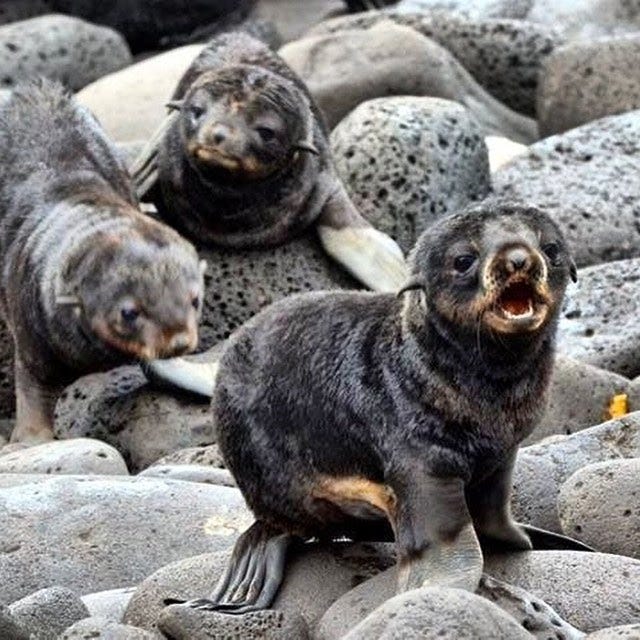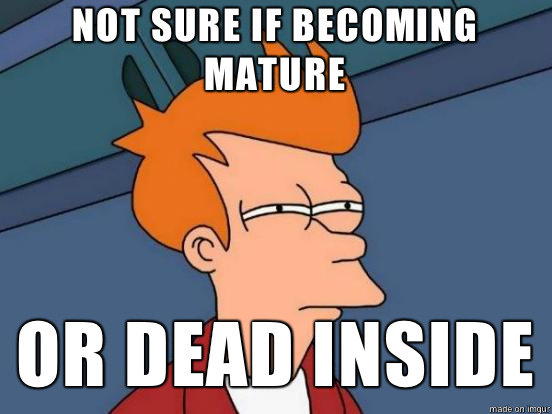So What, Who Cares (vol 1, issue 35) How the definition of adulthood has shifted
Happy weekend-to-be, everyone. May your to-do lists be short and your DVR filled with things you're looking forward to watching.
*

This is National Wildlife Refuge Week, if the seals on Instagram are to be believed, so what better time than the present to bone up on what, exactly, a wildlife refuge is and how it differs from a national park? The short answer: U.S. national parks are basically for looking at and playing in -- viz. the stated purpose "to conserve the scenery and the natural and historic objects and the wild life therein and to provide for the enjoyment of the same in such manner and by such means as will leave them unimpaired for the enjoyment of future generations." Wildlife refuges, on the other hand, are basically a fancy term for "this is what it would look like if people weren't around" and they exist to protect species' natural habitat. There is some regulated hunting and fishing in a wildlife preserve.
President Obama recently exercised executive power under the 1906 Antiquities Act in order to create the world's largest marine reserve by broadening the Pacific Remote Islands National Marine Monument from almost 87,000 square miles to more than 490,000 square miles. (George W. Bush had established the reserve with his own exercise of the Antiquities Act back in 2009.) Then, a few days later, Obama did it again by making California's San Gabriel Mountains a national monument.
So what? Obama has used the Antiquities Act thirteen times since taking office, thereby sidestepping the need for Congressional approval to designate or expand national monuments or reserves. By contrast, a National Wilderness area can only be designated by Congress -- and only one wilderness area has been created since 2009. Observers cite political deadlock.
Who cares? Managing the San Gabriels has been a decade-long concern in Southern California, but legislation to funnel federal resources to the environmentally critical, cash-strapped area was mired in partisan bickering in the U.S. House of Representatives. This designation does a political end run around that particular obstacle. It also serves some political notice: Latino pols are using the success of the San Gabriel campaign as a way to advance the argument that the Latino agenda is broader than "we have concerns about immigration" and the Latino electorate's agenda is a force to be reckoned with.
Also worth noting: Republicans pushed a bill through the U.S. House of Representatives that would weaken the Antiquities Act. The bill's lead sponsor, Rob Bishop (R-UT), counts the oil, gas and mining industries among his chief campaign contributors. The bill is pending in the Senate.
*
The definition of "adulthood" is changing. According to a recent report in NPR, social scientists have found that people's top three markers for adulthood are "accepting responsibility for self, financial independence and making independent decisions."

This shifting definition reflects one facet of an observation that Naomi Cahn and June Carbone have been putting forth for years: In their 2010 book, Red Families v. Blue Families: Legal Polarization and the Creation of Culture, the two family-law professors argued that the U.S.A. has a profound cultural divide and that divide reflects people's conceptualization of adulthood. Per Jonathan Rauch: "To define the divide in a sentence: In red America, families form adults; in blue America, adults form families."
So what? In this modern definition of adulthood, the markers for adulthood are uncoupled from specific and external social rituals and milestones (such as marriage or parenthood).
Who cares? Sociologists say that marriage is now considered a "capstone" achievement and not the first step to adulthood. And indeed, the share of young adults in the country who have not married has hit an historic high. One of those reasons? Young adults are taking responsibility for themselves and pursuing advanced degrees, and waiting for marriage until they are done with their education and established in the workplace. So now you know why you shouldn't ask your twentysomething cousin when she's planning to get married and have babies. Your Thanksgiving is saved!
*
Your pop-culture note of the day: Key and Peele has been killing it this year, and the show's sketch about concussions on the football field is no exception.
(Personally, the sketch I have laughed hardest at this year is "Georgina and Esther and Satan," but this version I linked to has all of the swears. ALL OF THEM. But oh! The physical comedy, coupled with the way Jordan Peele shrills "The divine Kegel!" ... I was laughing so hard, I cried.)
*
Did you miss an issue of So What, Who Cares? The archive is here. Also, there is now a topic index that tells you what was in each issue. If you're like, "I remember there was an issue with otters in it, but when ...?" -- well, now you can find it. (It was September 24, btw.)
As always, I welcome your feedback and suggestions via email or Twitter. Always let me know what you think about So What, Who Cares? If you really like it, tell a friend to subscribe.

